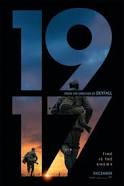
Directed by
Sam Mendes
119 minutes
Rated MA
Reviewed by
Bernard Hemingway

1917
Synopsis: Midway through WWI Lance-corporals Blake (Dean-Charles Chapman) and Schofield (George MacKay) are ordered to take a message to the front-line in order to stop an imminent attack by British troops on the retreating Germans because HQ has discovered that they are about to plunge into a trap that will see the certain annihilation of sixteen hundred men.
As a technical feat 1917 is a tour de force as it follows the mission of two dogged young soldiers across one day and night in a single seemingly continuous travelling shot that takes us out of the Allied trenches, across No Man’s Land, through a shelled-out village, down a raging river and finally to the front line. Despite the "one-shot" brouhaha the film lies outside the pure one shot technique made famous by Alexander Sokurov’s 2002 benchmark Russian Ark (the two hour film covers an eight hour time span and clearly, as in the scene where a biplane crashes into a barn indicates, there must have been a good deal of digital manipulation). Nevertheless, cinematographer Roger Deakins is a shoo-in for an Oscar (he won).
However, whilst impressive as a visual experience one may question whether the technical tour-de-force actually enhances the film’s subject matter or whether it disconnects us from it. I tend to lean towards the latter view.
As has been depicted in many films from Lewis Milestone’s All Quiet On The Western Front (1930) to Oh! What A Lovely War (1969) WW1 was an unprecedented catastrophe as modern technology met antiquated military methods. As much as 1917 gives us a remarkable recreation of the apocalyptic devastation of the war zone there is little sense of the real horror of war as experienced by the two messengers or indeed anyone else involved in the madness. One of the messengers expeditiously dies as do a couple of faceless Huns but for the most part the narratively simple, dramatically low-key film merely matter-of-factly charts their mission. When in one scene an officer (Mark Strong) tells the surviving messenger not to think too much about his comrade’s death it feels more than a little inadequate to the situation.
If there is little emotional impact on a personal level Mendes also misses an opportunity for a Speilbergian flourish with the “first wave” attack that comes at the film’s end. The director could have used that sequence to overwhelm us with the carnage à la Saving Private Ryan but he pretty much skates through it. And on the credibility front one can't help but ask how could the counter-order that presumably would have been hand-written in ink, let alone the photos that we see at the end of the film in pristine condition, have survived their considerable dunking.
1917 is an impressively-made film but in the considerable annals of war films far from being one of the best, let alone, great ones.

Want more about this film?


Want something different?




